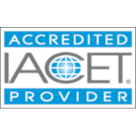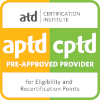Product Details
Topics Covered
- Ethical frameworks
- Ethical leadership
- Whistleblowing
- Corporate responsibility
- Principles of accessible design
- Complying with federal accessibility standards (WCAG, ISO)
- Fostering an inclusive work environment
- Unconscious bias
- Inclusive design practices
- Inclusive strategies for remote teams
Key Features
- Mobile-friendly
- Audio-enabled
- Badge and credit-awarding
- Real-world case studies
- Fully accessible
- Games & Flashcards
- Expert-supported
- Video content
Course Preview
Course Description
Learning Outcomes
- Describe the standards of professional practice for designers
- Define key terms related to ethics, accessibility, and diversity and inclusion
- Recall common ethical frameworks
- Identify warning signs of ethical problems
- Name common characteristics of ethical leadership
- Describe key goals of accessibility
- Identify principles of accessible design
- Apply accessibility principles to design concepts
- Describe the relationship between accessibility and inclusive design
- Determine best practices for promoting inclusivity in the workplace
- Define unconscious bias
- Identify elements of inclusive leadership practices
Notes
This course has an "Ask the Expert" feature, which submits your questions directly to an expert in the field you are studying. Questions are answered as quickly as possible and usually within 24 hours.
As an Accredited Provider, MindEdge offers for its learning events that comply with the Continuing Education and Training Standard.
Learners must achieve an average test score of at least 70% to meet the minimum successful completion requirement and qualify to receive credit. Learners will have three attempts at all graded assessments.

